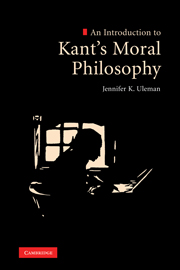Book contents
- Frontmatter
- Contents
- Acknowledgements
- 1 Introduction: the strange thing
- 2 A sketch of Kantian will: desire and the human subject
- 3 A sketch continued: the structure of practical reason
- 4 A sketch completed: freedom
- 5 Against nature: Kant's argumentative strategy
- 6 The categorical imperative: free will willing itself
- 7 What's so good about the good Kantian will? The appeals of the strange thing
- 8 Conclusion: Kant and the goodness of the good will
- Bibliography
- Index
7 - What's so good about the good Kantian will? The appeals of the strange thing
Published online by Cambridge University Press: 05 June 2012
- Frontmatter
- Contents
- Acknowledgements
- 1 Introduction: the strange thing
- 2 A sketch of Kantian will: desire and the human subject
- 3 A sketch continued: the structure of practical reason
- 4 A sketch completed: freedom
- 5 Against nature: Kant's argumentative strategy
- 6 The categorical imperative: free will willing itself
- 7 What's so good about the good Kantian will? The appeals of the strange thing
- 8 Conclusion: Kant and the goodness of the good will
- Bibliography
- Index
Summary
INTRODUCTION
Why ask about the good of free rational willing?
We have seen arguments that, for Kant, free rational willing is the good at which practice ought ultimately to aim – that free rational willing is, for Kant, the moral good. We have seen, that is, that the value of free rational willing grounds, for Kant, the commands of morality, and that our interest in free rational willing is what moves us to follow these commands. Here, we need to ask another question, namely, what allows free rational willing to play all these roles? What, that is, is so appealing about it? Kant thinks an interest in free rational willing is strong enough to compete with sensuous desire in moving our wills. Why? How? Wherein lies the pull of free rational willing?
These questions will seem distinctly unKantian to some. For some, insistence that morality eschew incentives, interests, or motives is a hallmark of Kantian thought. However, as we have seen, Kant's real claim is that morality must eschew empirical and external incentives, interests, and motives. The answers I offer here to these questions will also seem distinctly unKantian to some. I address the question of what pulls us toward free rational will in terms of appealing experiences and lived self-awarenesses. But this can seem all wrong, since free rational willing is noumenal if anything is: how could it appeal, attract, be experienced, be something like a ‘phenomenon’ with pull, at all?
- Type
- Chapter
- Information
- An Introduction to Kant's Moral Philosophy , pp. 145 - 174Publisher: Cambridge University PressPrint publication year: 2010



